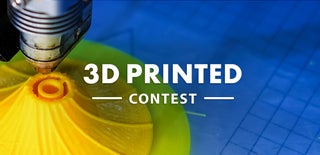Introduction: 3D Printed Wrist Orthosis
For this Instructable, I will show you how I made this wrist orthosis. It was developed to prevent movement of the wrist in a person suffering from tendonitis. In this case, the person uses the orthosis 24 hours a day in those days when she has pain. For this reason, it was necessary to create a design that allowed good ventilation and that it was comfortable for the person, having always the position suggested by the doctor.
(As you can see in the video, she can not bend the palm down, towards the wrist.)
This orthosis has worked now for 7 years!!! and still works perfectly (We just had to change a piece of foam it has inside, a couple of times)
Para este Instructable, les mostraré cómo hice esta órtesis de muñeca. Esta fue desarrollada para prevenir el movimiento de la muñeca en una persona que sufre de tendinitis. En este caso, la persona usa la ortesis las 24 horas del día en aquellos días en que tiene dolor. Por esta razón, fue necesario crear un diseño que permitiera una buena ventilación y que fuera cómodo para la persona, teniendo siempre la posición sugerida por el médico.
(Como pueden ver en el video, ella no puede doblar la muñeca hacia abajo)
Esta ortesis ha funcionado por 7 años ya!!! y aun sigue funcionando perfectamente (Nosotros solo hemos tenido que cambiar un pedazo de foami que tiene en el interior, un par de veces)
Step 1: 3D Scan
The first thing I did was to scan the person's arm - wrist - hand and open the file in a 3D Autodesk software.
Lo primero que hice fue escanear el brazo - muñeca - mano de la persona y abrir el archivo en un software 3D de Autodesk.
Step 2: First Lines
Then I created some planes so I could draw the curves I could see. After drawing those ones, I created new curves with the "offset" tool.
Después creé unos planos para poder dibujar las curvas que veía. Después de dibujar estas, creé nuevas curvas con la herramienta de "offset".
Step 3: Loft
The way I made a solid from the curves, was with the "loft" tool, so I selected the different curves and created a solid, and when I got the shape I wanted, I used the "loft" tool again to cut the other shape I created inside.
La forma en que hice el sólido desde las curvas, fue usando la herramienta "loft", asì que seleccioné las diferentes curvas y cree un sólido, y cuando obtuve la forma que deseaba, volví a usar la herramienta "loft" para hacer un corte con la forma que creaba en el interior.
Step 4: Cut
Later, I created new ways to cut the excess pieces so that the orthosis can be used without the need to add hinges or external elements, but it can be put on and held by itself.
Después, creé nuevas formas para cortar los pedazos sobrantes y que la ortesis pueda ser usada sin necesidad de agregarle bisagras ni elementos externos, sino que se pueda poner y se sostenga sola.
Step 5: Rounds
Rounding all the edges is very important so that there are no edges that could hurt the person.
Redondear todos los bordes es muy importante para que no queden aristas que puedan lastimar a la persona.
Step 6: Planes
Later, I created some planes around the orthosis.
Después, creé varios planos al rededor de la ortesis.
Step 7: Curves
On those planes I drew some curves.
En esos planos dibujé unas curvas.
Step 8: Cut
And then I made an extrusion of them, cutting the figures of the orthosis.
Y después realicé una extrusión de ellas, cortando las figuras de la ortesis.
Step 9: Rounds
Again, remember to round all the edges. And save the file as .stl
De nuevo, recuerda redondear todos los bordes. Y guarda el archivo como .stl
Step 10: 3D Print
Time to print it :)
Tiempo de imprimir :)
Step 11: Piece of Foam
I added a piece of foam so that it would not carve against that protruding bone (the head of the ulna bone, which I marked in the photo).
Agregué un pedazo de foami para que no fuera a tallar contra ese hueso que sobresale (un extremo del cúbito, que marqué en la foto).
Step 12: Use It
Now time to use it. (And if there is anything that needs to be fixed, then do it)
Ahora tiempo de usarlo. (Y si hay algo que necesite ser arreglado, arréglalo)

Participated in the
3D Printed Contest














